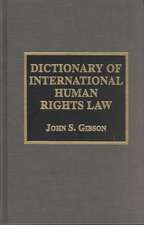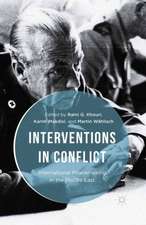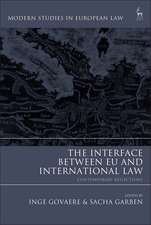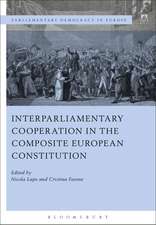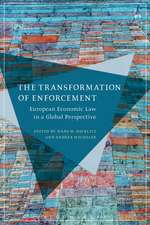Peacemaking, Power-sharing and International Law: Imperfect Peace
Autor Martin Wählischen Limba Engleză Hardback – 4 sep 2019
| Toate formatele și edițiile | Preț | Express |
|---|---|---|
| Paperback (1) | 237.57 lei 6-8 săpt. | |
| Bloomsbury Publishing – 21 apr 2021 | 237.57 lei 6-8 săpt. | |
| Hardback (1) | 510.75 lei 6-8 săpt. | |
| Bloomsbury Publishing – 4 sep 2019 | 510.75 lei 6-8 săpt. |
Preț: 510.75 lei
Preț vechi: 731.40 lei
-30% Nou
Puncte Express: 766
Preț estimativ în valută:
97.73€ • 102.31$ • 80.87£
97.73€ • 102.31$ • 80.87£
Carte tipărită la comandă
Livrare economică 05-19 aprilie
Preluare comenzi: 021 569.72.76
Specificații
ISBN-13: 9781509914258
ISBN-10: 1509914250
Pagini: 248
Dimensiuni: 156 x 234 x 23 mm
Greutate: 0.52 kg
Editura: Bloomsbury Publishing
Colecția Hart Publishing
Locul publicării:London, United Kingdom
ISBN-10: 1509914250
Pagini: 248
Dimensiuni: 156 x 234 x 23 mm
Greutate: 0.52 kg
Editura: Bloomsbury Publishing
Colecția Hart Publishing
Locul publicării:London, United Kingdom
Caracteristici
Provides helpful analytical framework for better understanding the legal challenges of transitional arrangements regarding the ongoing peace processes in Syria, Yemen and Libya.
Notă biografică
Martin Wählisch works for the United Nations on peace processes, national dialogues and conflict prevention, and is an Affiliated Lecturer at the Center for Peace Mediation and the Institute for Conflict Management at the European University Viadrina. He holds a PhD in International Law and an MA in Mediation.
Cuprins
1. IntroductionI. State Transitions, Power-Sharing and International Law II. Closing the Gap III. Methodology and Scope 2. Power-Sharing in Theory and Practice: Concepts, Mechanisms and Legal Challenges I. Ethnic and Religious Diversity as a Challenge for International Law II. Democracy Theory and the Perspective of Conflict ResolutionIII. Mechanisms IV. The Legal Debate V. Conclusion: The Necessity and Challenges of Bridging Interdisciplinary Perspectives 3. Power-Sharing on Trial: Sejdic and Finci v Bosnia and Herzegovina I. Bosnia and Herzegovina between Transition and TransformationII. Relevant Decisions of Bosnia and Herzegovina's Constitutional Court (1997-2009) III. ECtHR Definition of Ethnic-Racial Discrimination in Sejdic and Finci IV. Justifying Human Rights Restrictions V. Post-trial Developments and Constitutional Reform Process VI. Conclusion 4. Through the Lens of Human Rights Committees: Lebanese Political Confessionalism and Transitional Mechanism I. State Stability, Sectarian Traditions and Socio-Political Change II. Reports Submitted by Lebanon to the Committee on the Elimination of Racial Discrimination III. Debate in the Committee on the Elimination of Racial Discrimination IV. Analysis: Confessionalism and Non-Discrimination V. Transitional Power-Sharing, Unity Governments, Proportions of High-Level Posts and the Right to Participation VI. Proportionality and Time Limitations VII. Conclusion 5. On the Law of Peace: Parameters, Challenges and Limits I. The Quest for Absolute Limitations in Peacemaking II. Peremptory Norms and Peacemaking III. A Conceptual Model for Reflections about the Law of Peace Debate IV. Open Questions and Future Research Agenda V. Concluding Remarks
Recenzii
Lasting peace requires the respect for universal human rights. This book offers unique insights into how to find the balance between practical political solutions and the respect for international law. It is a rich resource for peacemakers and conflict parties, and an indispensable read on the phenomenon of the "imperfect peace".
A balanced examination of a key issue for mediators and international lawyers alike, the tension between human rights concerns and practical peacemaking. Waehlisch writes with the authority of one who is both an academic but also a political adviser with plentiful hands on experience in the regions from which he draws his case studies, the Balkans and the Arab world.
A rigorous reflection on the tension between peacemaking and the protection of human rights. The focus on two well-chosen case-studies brings the problem to life, and international law is presented in the light of deeply understood practical experience. This illuminating, thought-provoking work deserves to be read by everyone involved in the law, practice or study of peacemaking, statebuilding, or human rights.
Is there a law of peace? This insightful book deploys a comparative analysis drawing from the Balkans to the Middle East across the scholarly-practitioner divide to elucidate this now evolving normative development.
Imperfect Peace is an extraordinarily useful and original book that brings together concerns and areas of scholarship and practice that do not always communicate well. Grounded in actual cases it is a "must read" for anyone interested in peace and the evolution of the international system.
Practitioners and scholars alike will find the monograph helpful not only to understand better the relationship between international law and peace, but how to navigate and use it to best effect. Well-informed, Waehlisch offers a sober yet progressive account with insights about real-world dynamics along with thoughtful suggestions for recurrent problems. Those facing the challenges of transitions will find this a timely and indispensable reference.
A balanced examination of a key issue for mediators and international lawyers alike, the tension between human rights concerns and practical peacemaking. Waehlisch writes with the authority of one who is both an academic but also a political adviser with plentiful hands on experience in the regions from which he draws his case studies, the Balkans and the Arab world.
A rigorous reflection on the tension between peacemaking and the protection of human rights. The focus on two well-chosen case-studies brings the problem to life, and international law is presented in the light of deeply understood practical experience. This illuminating, thought-provoking work deserves to be read by everyone involved in the law, practice or study of peacemaking, statebuilding, or human rights.
Is there a law of peace? This insightful book deploys a comparative analysis drawing from the Balkans to the Middle East across the scholarly-practitioner divide to elucidate this now evolving normative development.
Imperfect Peace is an extraordinarily useful and original book that brings together concerns and areas of scholarship and practice that do not always communicate well. Grounded in actual cases it is a "must read" for anyone interested in peace and the evolution of the international system.
Practitioners and scholars alike will find the monograph helpful not only to understand better the relationship between international law and peace, but how to navigate and use it to best effect. Well-informed, Waehlisch offers a sober yet progressive account with insights about real-world dynamics along with thoughtful suggestions for recurrent problems. Those facing the challenges of transitions will find this a timely and indispensable reference.

